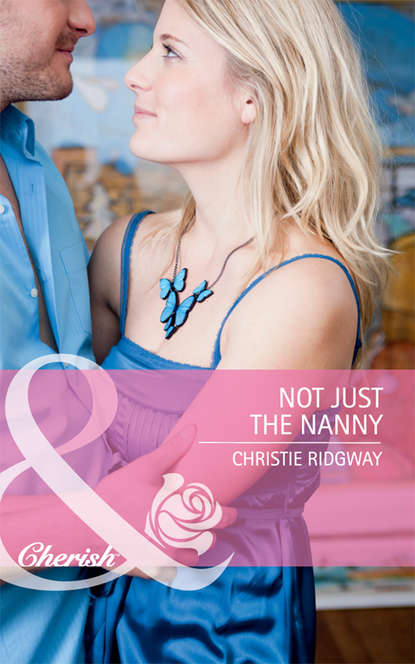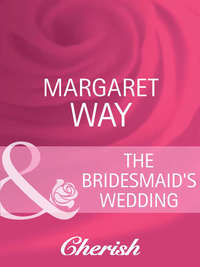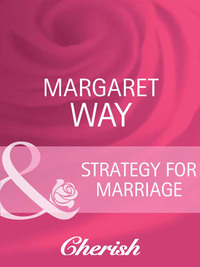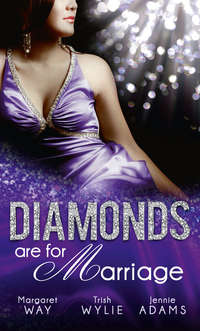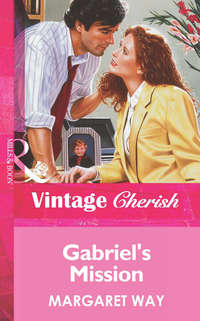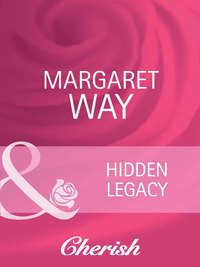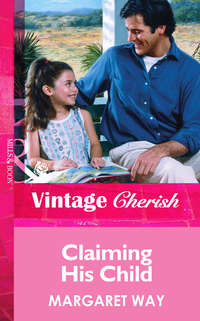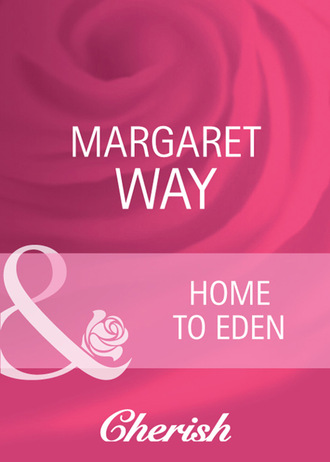
Полная версия
Home To Eden

“Lord knows how I didn’t visit you last night. I came close.”
“What stopped you, Drake?” Nicole picked up a pebble and sent it skimming across the water. The movement startled a flock of white corellas that exploded into the air in protest.
“I have to let you decide what you want.” He glanced down at her. She wasn’t wearing makeup—she didn’t need any with her skin—not even lipstick, which he found strangely erotic. “Which isn’t to say I’m going to wait a long time.”
“For me to decide to sleep with you?” Her head tilted, her eyes more green than blue in the shade of the wide-brimmed Akubra.
“You will, whenever, wherever. We both know it.”
She looked back at the peaceful, unspoiled scene. “It could be a mistake. Neither of us is exactly reconciled to the past.”
“I’m trying, Nic. You find it very hard to trust.”
“I’m concentrating on getting my life right.”
“You think increasing intimacy with me will interfere with that?” His tone was deeply serious.
She nodded. “I can’t deal with you like I’ve dealt with other men in my life.”
Dear Reader,
Home to Eden is the final book in the KOOMERA CROSSING series. I hope both my loyal, much-valued readership and welcome newcomers will have enjoyed the previous four in the series. I burned the midnight oil on one of them. I’ll leave you to guess which!
Throughout the series, indeed my long career, you will have noticed I enjoy writing about families—in particular, dysfunctional families. These problematic families crisscross society, from the most privileged to the severely disadvantaged.
Small wonder I’m drawn to exploring family life. There are so many mysteries connected to families: past secrets, double lives, things that are never spoken about but forever hover in the consciousness. Most bondings bring comfort, friendship and support. Some emotional attachments, however, can go beyond the norm. I’ve drawn on this for Home to Eden, coming at it from the angle of obsessive attachments. One can readily see such attachments could be a by-product of certain conditions such as loneliness and isolation. Families who live in remote areas are more dependent on each other for survival and emotional support. Outback stations certainly qualify as remote. The wonderfully inspiring, frightening and funny, tragic and violent stories of Outback life are legion. There are heroes and heroines and, inevitably, as anywhere else, villains.
The heart is a very strong yet very vulnerable organ. Love and hate coexist there. Human beings can love fiercely, yet still be capable of hurting the object of that love. Jealousy has to be regarded as a great catalyst for disaster. Some jealousies pave the way to tragedy and death. Home to Eden is such a story. My aim, as always, is to give my readership good stories they can enjoy. I hope I’ve succeeded with KOOMERA CROSSING.
Best wishes,
Margaret Way
Margaret Way
Home to Eden

MILLS & BOON
Before you start reading, why not sign up?
Thank you for downloading this Mills & Boon book. If you want to hear about exclusive discounts, special offers and competitions, sign up to our email newsletter today!
SIGN ME UP!
Or simply visit
signup.millsandboon.co.uk
Mills & Boon emails are completely free to receive and you can unsubscribe at any time via the link in any email we send you.
CONTENTS
PROLOGUE
CHAPTER ONE
CHAPTER TWO
CHAPTER THREE
CHAPTER FOUR
CHAPTER FIVE
CHAPTER SIX
CHAPTER SEVEN
CHAPTER EIGHT
CHAPTER NINE
CHAPTER TEN
CHAPTER ELEVEN
CHAPTER TWELVE
CHAPTER THIRTEEN
CHAPTER FOURTEEN
CHAPTER FIFTEEN
CHAPTER SIXTEEN
CHAPTER SEVENTEEN
PROLOGUE
TWELVE-YEAR-OLD Nicole Cavanagh in her lacy white nightdress stands at the first landing of Eden’s grand divided staircase nursing a terrible apprehension. Her small fists are clenched tight. She can’t seem to get enough air. She is trying to guess the reason for all the commotion downstairs, even as the thought keeps rising that it is all about her mother, Corrine. The thought is terrifying.
It is barely dawn, the light seeping in through the great stained-glass window directly behind her in waves of jeweled splendor: ruby, emerald, sapphire, topaz, amethyst. Nicole pays no attention even though the effect is entrancing.
Something is wrong. Something is terribly wrong. There is always turbulence when her father, Heath, is at Eden. Suddenly overcome by a gnawing premonition, she starts to tremble, reaches out to grasp the smooth mahogany banister as though she’s gone blind and is petrified of falling. Her ears strain to pick up exactly what the voices are saying. Her father’s voice blustery like wind and thunder overrides all others. He is such a violent man. She can easily pick out Aunt Sigrid’s tones, clipped but slightly hoarse; Aunt Sigrid once had a tracheotomy. Her aunt is a severe woman, her manner imperious, a consequence perhaps of being born a Miss Cavanagh of Eden Station. She is quite without her younger sister’s beauty and charm—“Left you in the dust, didn’t she, Siggy,” was her father’s cruel comment. But her aunt has always been good to Nicole in her fashion. As had Louise, her lovely grandmother, a kind and devoted woman who now sounds shaky and deeply worried. Grandfather Giles’s cultured tones reassure her, calm and reasonable as ever.
Nevertheless, Nicole can measure what it all means. Child of a highly dysfunctional family, she has inbuilt antennae that track trouble. A frantic family row is in progress—she picked up on that almost from the moment she swung her legs out of bed. Aunt Sigrid always says she is way too knowing. From the sound of his voice, her father has worked himself into a frenzied rage. She has learned over the years from her practice of eavesdropping—the only way she can ever find out anything—that her often absent father is, as Aunt Sigrid said, “a disgrace to our proud name, an adventurer, a compulsive gambler, money spills through his fingers like water, he brought nothing to the marriage. Even the big diamond engagement ring he presented to Corrinne is a fake.”
Yet he is very handsome in a dissolute kind of way. Nicole has looked that word up in the dictionary. Dissolute. It meant all those things. Perhaps that was what brought her mother to the marriage, his sheer animal sex appeal. Aunt Sigrid never failed to point that out. Aunt Sigrid’s own husband, Alan, “largely maintained by Father,” is nearly devoid of that quality and has no hope of ever gaining it.
She can’t hear her cousin Joel’s voice. Almost four years her senior, already six feet tall, Joel is probably fast asleep. Joel’s ability to tune out family arguments is impressive. He professes to despise his father for being such a wimp, hates his mother’s constant nagging—who doesn’t?—calling his grandfather a “throwback to the feudal age” with his insistence on the importance of family, the proper respect, good manners, the sense of responsibility that should go hand in hand with privilege. Joel is something of a misfit.
“I love only you, Nikki. You’re beautiful and good. You’re the closest person in the world to me.”
She isn’t good at all. Even at twelve she is, as her aunt puts it, “hell-bent on establishing her place in the world.” That means eventually inheriting Eden. Her grandfather has promised it to her. She loves her historic home with a passion. She has that in common with her grandfather and her aunt Sigrid, but Aunt Sigrid will never inherit. Nor will Joel. That, too, her grandfather has confided. Eden is hers. She is the chosen one with special qualities which her grandfather claims he sees in her. Her grandfather’s love and faith sustains her. He plays the dominant male role in her life. He is Sir Giles Cavanagh of Eden Station.
Her father starts to roar again, a sound that reverberates through the house. She steps back instinctively, overcoming the sensation he has actually struck her. Which he has on occasion and she never did tell Grandpa.
“I’ll tell you who she’s with. Bloody McClelland, that’s who. The arrogant bastard. Always thinking herself a cut above me. But she chose me, not him. Now she’s picked up with him right under your noses, the arctic bitch.”
“And where have you been all this time, Heath?” Her aunt’s voice cracks with contempt. “What do you get up to in Sydney apart from gambling? You’re never far from the racetrack or the casino. Do you think we don’t know that? You’re an addict. Gambling is a drug.”
“There’s more attraction in gambling than living here,” her father answers furiously. “The lot of you looking down on me. The Cavanagh black sheep. Always so chillingly polite, but you bloody hate me. You just don’t have the guts to say so. What is a man to do when his wife doesn’t return home? To be humiliated like this! I tell you she’s finally gone off with that bastard. He never stopped loving her.”
“What you’re saying is crazy!” Now her grandmother speaks with intensity. “Corrinne would never leave her child. She adores Nicole.”
“But she’s done it this time, hasn’t she, dear Louise?”
Nicole’s grandfather cuts in as though he’s reached breaking point. “Instead of your usual ranting, Heath, I’d be obliged if you’d focus on what might have happened to your wife. I very much fear an accident. Instead of wasting time, we should be organizing a search party. Corrinne has the Land Cruiser. It could have broken down somewhere.”
“In which case she’ll soon be home.” Her grandmother sounds to anyone who knows her achingly unsure. “Corrine is a loving mother. She would never abandon Nicole. Never.” She repeats it like a mantra.
A low growl issues from her father as if he’d momentarily turned feral. “Who are you trying to convince, Louise? Your beloved Corrinne is no more than a common whore. You realize you’re admitting she’s taken up with McClelland. She’d leave me, but never Nicole.”
“I have no idea,” her grandmother, so proud, lies. “You were the one who snatched her away from him, Heath. Almost on the eve of their wedding. To think I was the one who invited you here for Corrinne’s engagement party. You were kin, after all. A Cavanagh. I felt sorry for you. I felt the family was too hard on you. How you repaid us.” A wealth of misery and regret in her voice, she went on, “You broke up two families who’d been the best of friends. The Cavanaghs and the McClellands. We’ve been here since the earliest days of settlement. The Cavanaghs even before the McQueens. We all stood together in this vast wilderness in order to survive. Our families would have been united but for you. Do you think I’d be speaking like this if you were a good husband and father? But you’re not, are you. I know you’re still obsessed with Corrinne. I know the black jealousy that prowls around your brain and your heart. Your mad suspicions. You never let her alone. But you scarcely have time for your own daughter, Nicole.”
No hesitation. A thud like a hand slamming down on a table. “If she is my daughter,” her father snarls.
Chaos is easy to create. It takes so few words. Glued to the banister, Nicole has trouble breathing.
“She’s yours, all right.” Aunt Sigrid is all contempt—and something more. What?
Grandma’s quavery voice gives the impression she is on the verge of tears. “How can you say that, Heath?”
“Sorry. I need proof.” Her father laughs. Not a nice laugh. A laugh utterly devoid of humor.
Her grandfather intervenes, speaking with grave authority. “My daughter would never have married you knowing she was carrying David’s child.”
“Perhaps she didn’t know at the time.” Her father produces another sneering laugh followed by the sound of boots scraping on the parquet floor. “To hell with the lot of you! You all idolize Corrinne, but she’s a cruel bitch. God knows why she married me. It had little to do with love.”
“Lust more like it!” The words seemed ripped from Aunt Sigrid’s throat.
Another mirthless laugh. “I bet you’ve spent a lot of time weeping over what you’ve never had, Siggy.” Her father speaks as though his sister-in-law is trash, not one of the Cavanaghs of Eden. “I’ll get this search party started. I can do that much. My bet is we won’t find her. She’s gone off with McClelland at long last. And none of you could stop her.”
At that, twelve-year-old Nicole collapses on a step, starting to succumb to a great sickness inside her. “Please, God,” she begins to pray, “don’t let anything bad have happened to Mummy.”
“For God’s sake, Nicole, what are you doing there?” Her father unleashes another roar, striding out into the hallway only to see her hunched up on the stairs. “Answer me, girl.”
No answer. No point. Not anymore. He isn’t her father.
“Leave the child alone, Heath.” The iron command in her grandfather’s voice then changes to tender, protective. “Nicole, darling, go back to bed. There’s nothing for you to worry about. Go, sweetheart.”
Go? When her mother is out there somewhere in the desert? “I’d rather go look for Mummy.” Nicole finds the strength to pull herself up, though her legs are wobbly with shock. “Please, Granddad, may I go with you?” She cannot bring herself to address the man, Heath, standing tall, staring up at her with his black eyes. Probably seeing her mother. Doesn’t everyone say she’s her mother’s mirror image?
Grandma rushes into the entrance hall, crushing one of her beautiful lace handkerchiefs to her mouth. “No, Giles!”
“There may be comfort in it for the child.” Sir Giles draws his wife tenderly into his arms.
“I wouldn’t be in the least surprised if the secretive little bitch knows where her mother is.” Heath Cavanagh spits anger and venom. Definitely not Daddy anymore. “Corrinne takes her everywhere. Tells her everything. Where’s your mother, girl?” he thunders.
In a flash, the secret forces within Nicole gather. It’s as though she can see through her mother’s sightless eyes. Searing whiteness. Nothing.
“Gone forever,” she says.
CHAPTER ONE
NICOLE WAS NEARLY twenty minutes late arriving at the Bradshaws’ splendid East Side apartment, although, Carol had confided earlier, she was the guest of honor. Today was her twenty-sixth birthday and Carol had arranged one of her “little dinner parties,” which usually turned out to be sumptuous affairs with glamorous and often famous people in attendance and “someone special” for her to meet. Carol, who had all but adopted her as the granddaughter she’d never had, was determined to find her the right husband and thus keep her in New York, or at the very least within easy traveling distance. That didn’t include far-off Australia, the home of her birth. The Outback was worlds away from New York, the fabulous hub of the New World.
The Bradshaws had taken her under their wing almost from the time she’d arrived in New York two years before, fresh from a three-year stint in Paris where she’d been living and studying painting. As fate would have it, the Bradshaws were visiting a SoHo art gallery the same afternoon Nicole took shelter there. The rain was coming down in buckets with intermittent booms of thunder. As she’d removed her head scarf, Carol Bradshaw, standing nearby, had burst out with, “What lovely hair! Like a glass of fine wine held up to the light.”
From that chance meeting a genuine, mutually rewarding friendship had evolved. The Bradshaws had lost their only child, a brilliant young man with the expectation of a full life ahead of him, to a freak skiing accident when he was about Nicole’s age; now stepping in to fill that gap was Nicole, a young woman reared in the isolated Australian Outback but severed from her country by a family trauma about which she hardly spoke.
Just once in the early days did Nicole confide in Carol about her mother’s tragic death, saying only that she was killed in a car accident when Nicole was twelve. She never divulged that the accident was on her family’s huge historic cattle station. She never said it was she who had led her poor grandfather, now dead from shock and grief, to the four-wheel drive at the bottom of Shadow Valley; she who first sighted the bodies in the sizzling heat. Her beautiful mother thrown clear of the wreckage, body splayed over an enormous boulder, sightless eyes turned up to the scorching sun; the man’s body still behind the wheel of the vehicle, windshield smashed, blood all over his face, just as dead. The man was David McClelland, whom her mother had jilted, on the eve of their wedding to marry Heath Cavanagh, a distant cousin and the black sheep of the family.
So many lives ruined all in the name of love!
The coronial inquest had brought in an open finding, leaving both families to endure years and years of cruel speculation, not the least of it the tricky question: who was Nicole Cavanagh’s real father? Everyone knew about the old love triangle, comprising Corrinne Cavanagh and the two young men who’d loved and fought over her. Inevitably doubts about Nicole’s paternity were sown. Rumor had it the victims of the accident may have been arguing—which was likely, given the highly explosive situation that promised to get worse. Corrinne may have made a grab for the wheel, causing McClelland to lose control of the vehicle. The vehicle went over the escarpment plunging to the floor of Shadow Valley. Heath Cavanagh’s account of his movements was accepted—one of Eden’s stockmen vouched for him in any case—but the enmity between Heath and David was legendary. Two neighboring pioneer families, once the greatest friends, had been estranged for several years after Corrinne had jilted her fiancé, David McClelland. Somehow the families had patched it up in a fashion to accommodate Nicole, who was the innocent victim of all this unhappiness. This allowed her to form a deep attachment to the young scion of the McClelland family, Drake. But the early estrangement was nothing compared to the bitter war that broke out after the tragedy.
Without the evidence to prove it, everyone in Koomera Crossing and the outlying cattle stations held Heath Cavanagh responsible, as though he were a demon capable of being in two places at one time. Either that, or it had been a murder-suicide, which no one wanted to believe. Nevertheless no one was really satisfied with the theory of death by misadventure. As a result the speculation continued to run wild.
Nicole told her American friends none of this. Like her, they’d known family tragedy, but not so much as a whiff of scandal had touched their respected name. In the Bradshaws, Nicole saw two handsome, aristocratic people in their mid-sixties who were friends when she truly needed them, alone as she was in another country. They became like family to her.
It was the Bradshaws who had found her her light-filled SoHo loft with its vast industrial windows. The Bradshaws who had introduced her to their wide circle of friends, a good many with sons and daughters her own age. When the Bradshaws saw her paintings, they’d insisted on helping her to get them shown. Through his contacts, Howard Bradshaw had even engineered her TV appearance that afternoon. Brief but important. She’d been introduced as a “sunny, up-and-coming young Aussie artist.” As near-perfect a misnomer as Nicole could think of, for her background was too full of black trauma. One day she reasoned she would confide in Carol fully, but not yet. The past was too close. Too filled with grief. Grief was the worst illness of all.
Carol came to the door to greet her, her face warm and welcoming, shining with pleasure.
“Nikki, dear!” They kissed. Not air kisses, but real displays of affection.
“So sorry I’m late. Traffic, forgive me.”
“Of course. You’re here. We watched your guest spot. You came over wonderfully well. So beautiful and articulate. Howard and I are proud of you.”
“It would never have happened without you and Howard,” Nicole said, smiling, then arm in arm with Carol accompanying her across the spacious and sumptuous entrance hall. A magnificent neoclassical parcel gilt console stood along one wall, overhung by an equally magnificent black lacquer and gilt mirror with two antique English gilt figurine lamps to either side of an exquisite flower arrangement. The Bradshaws were wealthy on a scale that made her own family’s fortune modest by comparison. She could see the elegantly dressed people gathered in the living room, which Carol had recently had made over—God knows why, for it had been beautiful before. Several heads were already turned in their direction. A little knot of people broke up, parting to either side.
Shock sucked the breath from her lungs as she felt the color drain from her cheeks. She put out one hand, then the other. Her mother was staring at her intently from across the Bradshaws’ opulent living room. The most marvelous apparition, astonishingly young and beautiful, a half smile caught on her mouth, her whirling auburn hair floating around her bare white shoulders.
The long years were as nothing. Yesterday. Whoever said time heals all wounds? Someone incapable of great depths of emotion. True love is eternal. Unchanging. It endures beyond death.
The apparition was very slender and delicate, like a fine piece of porcelain. She was wearing Nicole’s favorite color—violet-blue—with an all-over glitter of silver. A beautiful, feminine gown. Shimmering, light as air. Romantic.
Just like hers.
Rapture drained away as pain and despair flooded in. The long wall facing her, she saw now, was set with tall mirrored panels to reflect the chandeliers, the museum-quality antiques and the paintings. There was no apparition. She’d had no miraculous acquisition of psychic powers. How ridiculous to think so.
What she’d seen was her own reflection. An outwardly composed, inwardly disturbed young woman. One who had suffered a shocking childhood trauma and had never broken free of its horror. All those years of therapy, futile. There was no hiding place from grief. The memory of her beautiful mother still held her in its spell. She wanted her back so badly she was capable of unconsciously conjuring her up.
“Nikki, darling, whatever is the matter?” Carol held her arm, gazing at her in dismay. “You’re not ill, are you?”
Howard, tall and distinguished, a worried frown on his face, hastened to their side. “Nikki, dear?” He bent his silver head solicitously to hers.
“I’m so sorry.” From long practice Nicole held herself together. Tried to smile. “I’ll be fine in a minute. I felt a little faint, that’s all. Too much rushing about and the excitement of appearing on the show.” How could she possibly say she thought she’d seen someone long dead?
“I imagine you haven’t taken time off to eat,” Carol scolded gently. “Never mind. I’ve got all your favorite things. There now, your color is back,” she exclaimed in relief. “Howard, be a darling and fetch us both a glass of champagne.”
“Of course.” He hurried off.
Steady, Nicole thought. Steady. She took a calming breath, aware that a silence had fallen over the huge living room. She ran the point of her tongue over her lips. Her mouth was bone dry. A reaction to what she thought she’d seen, no doubt. But Carol and Howard were so very kind, she knew she’d be able to get through the evening.
IN THE EARLY HOURS of the morning the phone woke her, shrilling her out of the tormented dreams that had ceased to plague her for many long months but had returned suddenly in full force. The brain had an extraordinary power to relive the past just as it chose to throw up impenetrable walls. Though she returned to Eden only twice a year—for a short visit at Christmas and for her grandmother’s birthday in June—she couldn’t drive out its demons. They walked with her, talked with her, slept with her, appeared in her paintings, but never, ever would they reveal their secrets.


